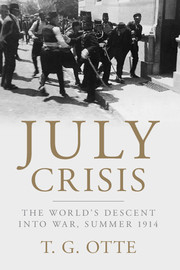Book contents
- Frontmatter
- Dedication
- Contents
- List of illustrations
- List of maps
- Preface and Acknowledgements
- List of abbreviations
- List of the principal dramatis personae
- Europe, 1914
- The Balkans, 1914
- Introduction
- 1 Prelude: the road to Sarajevo
- 2 Sarajevo and its echoes: 28 June to 5 July
- 3 The triumph of tactics over strategy: 6 to 21 July
- 4 Localizing the crisis: 19 to 23 July
- 5 The ultimatum: 23 to 26 July
- 6 Localizing the war: 26 to 28 July
- 7 Escalation: 29 July to 4 August
- Conclusion
- Index
- Plate section
- References
5 - The ultimatum: 23 to 26 July
Published online by Cambridge University Press: 05 July 2014
- Frontmatter
- Dedication
- Contents
- List of illustrations
- List of maps
- Preface and Acknowledgements
- List of abbreviations
- List of the principal dramatis personae
- Europe, 1914
- The Balkans, 1914
- Introduction
- 1 Prelude: the road to Sarajevo
- 2 Sarajevo and its echoes: 28 June to 5 July
- 3 The triumph of tactics over strategy: 6 to 21 July
- 4 Localizing the crisis: 19 to 23 July
- 5 The ultimatum: 23 to 26 July
- 6 Localizing the war: 26 to 28 July
- 7 Escalation: 29 July to 4 August
- Conclusion
- Index
- Plate section
- References
Summary
Count Leopold Franz Rudolf Ernest Vinzenz Innocenz Maria: ‘The ultimatum was first-rate! At last, at last!’
Baron Eduard Alois Josef Ottokar Ignazius Eusebius Maria: ‘Foudroyant! They nearly accepted it!’
The Count: ‘That would have infuriated me. Fortunately, we had the two little points in it, our investigations on Serbian soil and all that – well, they didn’t take that. They only have themselves to blame, the Serbs.’
The Baron: ‘If one thinks about it – because of two little points – and so because of a bagatelle a world war broke out! It is just too comical.’
KARL KRAUSIn the three weeks since Sarajevo, the Habsburg leadership had kept the other Powers guessing as to how Austria-Hungary was likely to react to the assassination of the Archduke. In their different ways Jagow, Grey, Poincaré and Sazonov had indicated their respective positions in anticipation of international complications. Jagow had affirmed the ‘blank cheque’, committing Berlin to unconditional support of its Austro-Hungarian ally without retaining any means of controlling, let alone restraining, its actions. Grey had correctly identified Germany and Russia as key to preventing the further escalation of the Austro-Serbian crisis, but had – again correctly – confined himself to encouraging Berlin and St Petersburg to exchange views on the situation in the Balkans. As for the Franco-Russian allies, the French president had sought to stiffen what he considered to be Russia’s flaccid stance in the face of a likely Austro-Hungarian move against Serbia. Sazonov, meanwhile, plagued as much by doubts about the correct policy response to the crisis as by his suspicions of Habsburg policy, had failed to communicate a consistent line to the other Powers, most significantly Austria-Hungary and Germany. Until Vienna revealed its hand, however, there was little more that any of the other chancelleries of Europe could do.
- Type
- Chapter
- Information
- July CrisisThe World's Descent into War, Summer 1914, pp. 222 - 285Publisher: Cambridge University PressPrint publication year: 2014



